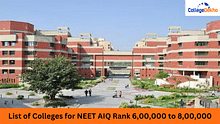Actuarial courses are a good option for candidates who love mathematics and are interested in economic statistics.The career in this field is very bright as some of the actuarial courses are internationally recognized and offer great salary prospects.

The growth of the Indian economy and the rapid development of businesses have created a higher demand for proficient individuals who possess expertise in actuarial science and excel in trend prediction. While the popularity of actuarial courses has increased over time, the number of institutes providing such courses remains limited.
Although only a few business schools offer MBA or PGDM programs specifically in actuarial sciences, aspiring individuals often opt to pursue an MBA in finance as a pathway to enter this field. Alternatively, there is a formal actuarial course available in India, offered by the Institute of Actuaries of India (IAI).
| Actuarial Science - Course Detail | MBA - Course Detail |
|---|---|
| PGDM- Course Detail | MBA Finance Management- Course Detail |
This institute offers a detailed actuarial course that imparts a detailed and structured education in the field of actuarial science. There are different levels of this course and the credentials of an actuary are granted only if the candidate clears all the exams of the actuarial course.
Actuarial Course offered by IAI
The Institute of Actuaries of India (IAI) conducts its own entrance exam i.e. Actuarial Common Entrance Test (ACET) to shortlist students for the actuarial course offered by it. The institute has recently changed the pattern of the ACET exam.
Actuarial Courses Entrance Exam
The exam details are discussed below:
Name of the Exam | Actuarial Common Entrance Test (ACET) |
|---|---|
Duration | 3 hours, single slot |
Total Marks | 100 |
Number of Questions |
|
Sections in the Exam |
|
Weightage of the Sections |
|
Exam Centres | 24 ( Mumbai, Delhi, Indore, Kolkata, Nagpur, Bangalore, Ranchi, Gurgaon, Kochi, Chennai, Bhubaneswar, Pune, Dehradun, Hyderabad, Patna, Raipur, Vizag, Jaipur, Coimbatore, Ahmedabad, Baroda, Lucknow, Guwahati and Chandigarh) |
Sample Papers and Reference Books | Students will be able to access sample papers and books on the official website of IAI once they have registered for the exam. |
According to the new format, the ACET exam is conducted thrice every year and aspiring candidates can register for the exam within the deadline of the respective slots. The first exam is conducted around April, the second round in June, and the third around December every year.
Syllabus of ACET for Actuarial Course
Broadly, the ACET exam covers five subjects and questions are varied in context. You can find the syllabus details of ACET and the sub-topics on the official website of IAI. The following are the subjects that are covered in the exam. IAI has released the timetable for the June 2023 exam . IAI is the authority that conducts (ACET) to offer admissions to actuary courses
- Mathematics
- Statistics
- English
- Data Interpretation
- Logic
Actuarial Course Exams and Qualifications:
In order to become an actuary certified and verified by the Institute of Actuaries of India (IAI), candidates will have to pursue the different levels of exams set by the institute after passing the ACET exam. There are following three stages of the Actuarial Science course offered by IAI.
1. Core Technical Stage (CT):
Exam Stage | Name of the Exam | Fee for Indians and SAARC Citizens | Fee for Other Candidates |
|---|---|---|---|
CT-1 | Financial Mathematics | Rs. 2500 | Rs. 6250 |
CT-2 | Finance and Financial Reporting | Rs. 2500 | Rs. 6250 |
CT-3 | Probability and Mathematical Statistics | Rs. 2500 | Rs. 6250 |
CT-4 | Models | Rs. 2500 | Rs. 6250 |
CT-5 | General Insurance, Life and Health Contingencies | Rs. 2500 | Rs. 6250 |
CT-6 | Statistical Methods | Rs. 2500 | Rs. 6250 |
CT-7 | Business Economics | Rs. 2500 | Rs. 6250 |
CT-8 | Financial Economics | Rs. 2500 | Rs. 6250 |
CA-1 | Actuarial Risk Management | Rs. 7500 | Rs. 18,750 |
2. Specialist Technical Stage (ST):
Exam Stage | Name of the Exam | Fee for Indians and SAARC Citizens | Fee for Other Candidates |
|---|---|---|---|
ST-1 | Health and Care Insurance | Rs. 4000 | Rs. 10,000 |
ST-2 | Life Insurance | Rs. 4000 | Rs. 10,000 |
ST-4 | Pension and Other Employee Benefits | Rs. 4000 | Rs. 10,000 |
ST-5 | Finance and Investment A | Rs. 4000 | Rs. 10,000 |
ST-6 | Finance and Investment B | Rs. 4000 | Rs. 10,000 |
ST-7 | General Insurance: Reserving & Capital Modeling | Rs. 4000 | Rs. 10,000 |
ST-8 | General Insurance: Pricing | Rs. 4000 | Rs. 10,000 |
ST-9 | Enterprise Risk Management | Rs. 4000 | Rs. 10,000 |
3. Specialist Applications Stage (SA):
Exam Stage | Name of the Exam | Fee for Indians and SAARC Citizens | Fee for Other Candidates |
|---|---|---|---|
SA-1 | Health and Care Insurance | Rs. 5000 | Rs. 12,500 |
SA-2 | Life Insurance | Rs. 5000 | Rs. 12,500 |
SA-3 | General Insurance | Rs. 5000 | Rs. 12,500 |
SA-4 | Pension and Other Employee Benefits | Rs. 5000 | Rs. 12,500 |
SA-5 | Finance | Rs. 5000 | Rs. 12,500 |
SA-6 | Investment | Rs. 5000 | Rs. 12,500 |
Exemption from CT, CA, and ST Exams
You can apply for the exemption criteria basis which you will not have to appear for certain CT, CA, and ST exams, provided, you have qualified for other exams deemed equivalent by the IAI from the institutes and universities that follow standards recognized by the IAI. Candidates will be eligible for an exemption if they have qualified certified exams conducted by the following institutions:
- Institute and Faculty of Actuaries
- Indian Statistical Institute, Kolkata
- Casualty Actuarial Society
- University Courses and IFoA Exemptions
- Other Professional Qualifications
The IAI also offers other internationally certified courses like Chartered Enterprise Risk Actuary (CERA) qualification. Candidates have to qualify ST-9 exam in order to be eligible for the CERA qualification. Another requirement for this course is to attend the ERM seminar.
Other Actuarial Courses
Name of the Course | Type of Course | Duration |
|---|---|---|
MBA Actuarial Science | Master Degree | 2 years |
M.Sc. Actuarial Science | Master Degree | 2 years |
B.Com. Actuarial Science | Bachelor Degree | 3 years |
B.Sc. Actuarial Science | Bachelor Degree | 3 years |
B.Sc. Actuarial and Financial Mathematics | Bachelor Degree | 3 years |
PG Diploma in Actuarial Sciences | PG Diploma | 2 year |
Eligibility Criteria for Actuarial Courses:
Bachelor's Degree and ACET:
- You can apply for the ACET exam by the IAI after passing class 12, however, the institute expects candidates enrolled in higher education (especially in the mathematics field) to apply for the course.
- Similarly, for bachelor's degree courses, you will be required to pass at least class 12. Admissions are done on the basis of merit.
Master's Degree and PG Diploma:
- You can apply for MBA and M.Sc. courses in this field after passing graduation with a minimum of 60% aggregate marks.
- Admission in PG Diploma and MBA courses is done on the basis of MBA entrance exams like CAT , CMAT , and MAT .
Jobs and Salary after Pursuing Actuarial Sciences:
Career opportunities after pursuing these courses are very bright as actuarial science is a very complex field of finance and economy. Candidates who have pursued the course from IAI get lucrative offers from MNCs and are often invited by the Government to work with them. Following are some of the reputed firms that hire actuaries:
- Liberty Mutual
- The Travelers
- Milliman
- Towers Watson
- The Hartford
- ING
- Allstate
- Nationwide
- Towers Watson
- Aon Hewitt
- Prudential
IAI-qualified and certified professionals can expect a salary package of up to Rs. 30 lakhs per annum and more depending on the type of offers and country that is offering them jobs.
MBAs can also scratch packages varying from Rs. 6 to Rs. 12 lakhs per annum depending on skill, experience, and the colleges they are graduating from. Some of the top MBA colleges in India offer good job opportunities in this field. Admissions to top MBA colleges are done on the basis of entrance exams.
For admission-related queries, you can fill out our Common Application Form , our admissions experts will guide you to find the right course and college of your choice. All the Best!
Are you feeling lost and unsure about what career path to take after completing 12th standard?
Say goodbye to confusion and hello to a bright future!

Was this article helpful?




















Similar Articles
Know the Difference Between B.Com and B.Com (Hons.)
Maharashtra B.Com Admission 2025: Dates, Application Procedure, Fees, Selection
Best Courses after 12th for Commerce Students
Top B.Com Colleges Accepting CUET 2025 Score in India: Fees, Eligibility, Admission Process
Top 10 Economics Colleges in Delhi University
Shri Ram College of Commerce (SRCC) CUET Cutoff 2025: Expected Cutoff based on Previous Trends